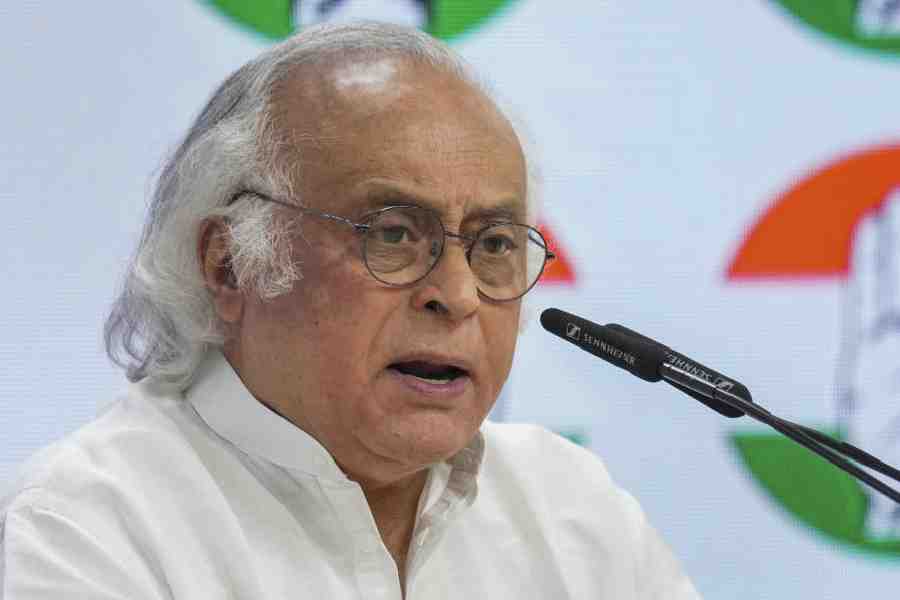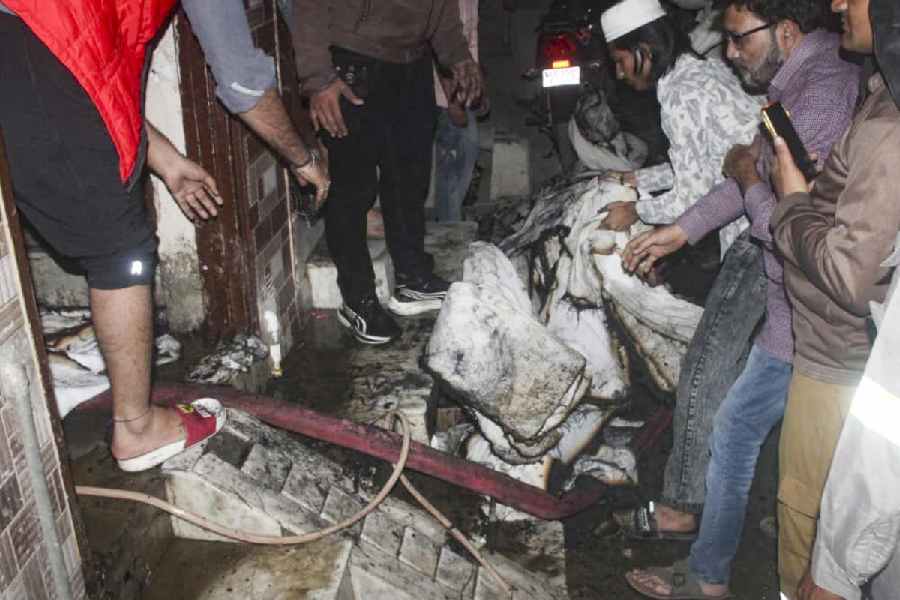 |
Prosenjit, Bengali filmdom’s one and only super star, exudes politesse. He is profoundly apologetic when he keeps me waiting while shooting on the sets of Swapan Saha’s Golmaal. It’s a fight sequence and Prosenjit, with injured friend on his back, throws his arms and legs at a bunch of thickset goons. The kung-fu style kicks miss them by a mile, but you know they will make resounding contact on screen. Dhishum! And the brave hero will have vanquished the baddies once again.
But after dealing in such mainstream masala for 25 years, it seems that the serious actor in Prosenjit is struggling to get out. So even as he continues to straddle commercial Bengali cinema, the 42-year-old star, his chocolate boy good looks slightly faded now, is trying to extend his artistic horizon. He has been busy working in a slew of art house and semi-art house films, many of which will hit the theatres this year. At present he is shooting for Rituparno Ghosh’s “experimental” film Sab Charitra Kalpanik where he plays an oddball, yet brilliant, misfit. Khela, another film by Ghosh, also starring Prosenjit, will release this year, as will Buddhadeb Dasgupta’s national award-winning Swapner Din and his Aami, Yasin Aar Aamar Madhubala. Prosenjit plays off-beat roles in both films.
That’s a fairly impressive haul of “serious” cinema for an actor who tends to be dismissed by Bengal’s high-minded élite as someone who stars in lowbrow potboilers or tearful, over-the-top, family melodramas. Clearly, Prosenjit is going all out to turn that perception on its head.
“My aim now is to do at least two or three such films in a year,” he says when we finally sit down for a chat — in his make-up van that’s parked on a vacant lot inside the drowsy and derelict Bharatlakshmi Studio in Tollygunge. As dusk falls, monster mosquitoes swarm around, keening angrily. But inside the van we are snug amidst red plush and an AC that cranks away, blowing lukewarm air at us. Prosenjit, or Boomba, as his friends call him, looks relaxed and ready to talk.
Having been at the top of his trade for over two decades, Prosenjit is now very clear about where he wants to be at this stage of his career. “I have achieved all that there was for me to achieve in commercial Bengali cinema,” he says with humility. He is not far off the mark. For he has made nearly 300 films already and racked up more hits than anyone else in the last 25 years. Whether he plays subaltern or scion of a rich man, whether he romances around trees or beats up the bad guys, the masses love him. Even in 2007, Tollywood’s biggest grosser was Bandhu, a Prosenjit-starrer that made about Rs 3 crore, which is huge by Bengali film standards. And at any point of time, he roughly has Rs 10 to 15 crore riding on him.
“But an actor needs fresh challenges,” says Prosenjit, “Otherwise he will stagnate.” So, although he remains passionately committed to commercial Bengali movies, he is now keen to make a name for himself in the international arena. And acting in films like Sab Charitra Kalpanik — films that will invariably do the international film fest circuit — could, he feels, get him that recognition.
But what do directors like Rituparno Ghosh or Buddhadeb Dasgupta see in him that they are lining up at his door? “You need to ask them that,” he retorts. We do, and they swear by his commitment to doing good work. As Dasgupta says, “He has this genuine urge to play challenging roles. I think it’s this urge that keeps the actor in a person alive. Besides, Prosenjit can do wonders for a role if he is motivated by the script and the direction.” And if the work is good, he doesn’t care about the money either, adds Dasgupta.
That’s high praise. And no doubt Prosenjit has earned it. After all, this is not his first foray into so-called serious cinema. His competent portrayal of the weak-willed, libidinous Mahendra in Rituparno Ghosh’s Chokher Bali (2003), for instance, won him a fair amount of critical acclaim, setting him up as a viable actor in off-mainstream cinema.
Competence and professionalism have really been the hallmark of Prosenjit’s marathon run in Bengali cinema. “And determination,” he adds, smiling.
That too. For Prosenjit, son of yesteryear movie star Biswajit Chatterjee, had to do it the hard way. Brought up in the lap of luxury in childhood, the comforts disappeared once his parents separated and Prosenjit, along with his sister and mother, had to deal with vastly reduced circumstances. “As a teenager, when I should have been studying or playing, I had to start thinking of earning a living.” But he deftly sidesteps any questions about his absent father, saying, “Looking back, I am glad I had to struggle. I have seen both the highs and the lows. And whatever I have achieved, I have achieved on my own steam.”
He has many bitter memories of humiliation and slight when he was making the rounds of Tollygunge’s studios, hoping to get a break as an actor. “But I hung on. And my mother supported me all the way,” he says. Indeed, no hardship was too much for him at the time. He took a small room — “little bigger than this van” — in a guesthouse in Kasba when he got a role in a Tapan Sinha film called Aatanka in the early Eighties because the commute from Dum Dum, where the family used to stay at the time, took far too long. He lived there for over a year, and ate at a “pice” (dirt cheap) hotel near the Kasba railway station.
But all that changed once the hits started pouring in. Prosenjit had clicked as a hero, resuscitating an industry that was showing distinct signs of rigor mortis after the death of Uttam Kumar. Come to think of it, hasn’t he been the most prolific deliverer of hits after the great Uttam Kumar?
Humble as ever, Prosenjit replies, “I can never compare myself with Uttam Jethu. People like him, Amitabh Bachchan, Dilip Kumar — they are legends. They are my role models and my inspiration.”
If he has a major drawback, it is his emotional nature, says Prosenjit, who claims to wear his heart on his sleeve. “That has been my undoing on many occasions.” After two failed marriages — and innumerable stories of torrid affairs with co-stars like Rituparna Sengupta — he has finally settled down with former actress Arpita Pal. He denies his alleged relationship with Rituparna, though, dismissing it as media-manufactured gossip. But he admits that he and Rituparna, with whom he made nearly 50 films in the 90s, were the most successful romantic pair in Bengali cinema after the famed on-screen chemistry of Uttam Kumar and Suchitra Sen.
He is more forthcoming on his other heroines, and funnily enough, they actually span two generations — from the likes of Moon Moon Sen and Vijayata Pandit in the 80s to Raima Sen, Koel Mullick, et al, today. “I have seen Raima and Koel since the time they were so high. That’s why I say that I need to keep Farex in my icebox — for my baby heroines!” he jokes.
In the same mood of levity, he declares that he’s a pretty bad husband. “Any woman who is able to spend her life with me deserves a salute. I give all credit to Arpita!” But he claims to score somewhat better as a father to his three-year-old son Trishanjit. “In any case, I am not at all into partying-shartying. Whatever free time I get is spent at home with my family. Or I watch movies. I love watching movies of every kind.”
Talking to Prosenjit, you get the feeling that he is a man with a plan — a plan for the present and a plan for the future. If the present shapes up the way he wants it to, he would like to turn to direction in the next three to four years. That’s about the time when Bengali cinema too will witness a resurgence, he predicts. In anticipation, he has already set up a production company called Ideas Pvt. Limited and has even got a tie -up with Reliance’s Big Music to make 12 films with them.
“People are now beginning to realise that the market for Bengali cinema hasn’t been tapped properly,” says Prosenjit. “As infrastructure improves — in the suburbs, in the rural areas — and more money comes in, we’ll automatically get good stories, we’ll get the technical gloss we lack. Because we need to have good, sensible commercial cinema, like a Chak De! India, for instance. And I am sure that will happen.”
Until it does, Prosenjit is enjoying what he’s doing — kicking ass in action flicks and playing meaty, off-beat roles with equal élan.











